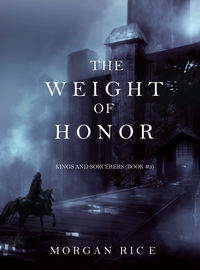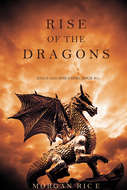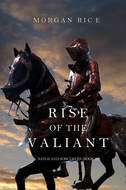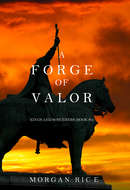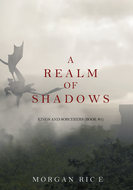Kitabı oku: «The Weight of Honor», sayfa 3
More Pandesians raised spears to hurl their way, and Duncan braced himself, realizing they were not going to make it through the gate in time – when suddenly, to his surprise, the soldiers stumbled and fell, face-first. He looked up to see arrows and swords in their backs, and he felt a rush of gratitude to see Bramthos and Seavig leading a hundred men, forking off from Kavos, who faced off with the garrison, and turning back to aid him.
Duncan redoubled his efforts, pushing with all his might as Anvin and Arthfael squeezed in beside him, knowing he had to get the gap wide enough for his men to charge through. Finally, as more of his men squeezed in, they dug their feet into the snowy ground and began to walk. Duncan took step after step, until finally, with a groaning, the gates opened halfway.
There came a victorious shout behind him and Duncan turned to see Bramthos and Seavig leading the hundred men forward on horseback, all of them rushing for the open gate. Duncan retrieved his sword, raised it high and charged, leading the men through the open gates, stepping foot inside the capital, throwing all caution to the wind.
With spears and arrows still raining down on them, Duncan knew at once that they had to gain control of the parapets, which were also equipped with catapults which could do unlimited damage to his men below. He looked up at the battlements, debating the best way to ascend, when suddenly he heard another shout and looked ahead to see a large force of Pandesian soldiers rallying from within the city and charging their way.
Duncan faced them boldly.
“MEN OF ESCALON, WHO HAS INHABITED OUR PRECIOUS CAPITAL!?” he shouted.
His men all shouted and charged behind him as Duncan remounted his horse and led them to greet the soldiers.
There followed a great clash of arms as soldier met soldier, horse met horse, and Duncan and his hundred men attacked the hundred Pandesian soldiers. Duncan sensed that the Pandesians were caught off guard in the dawn, had smelled blood in the water when they had spotted Duncan and his few men – but had not expected such a huge number of reinforcements behind Duncan. He could see their eyes widen at the sight of Bramthos, Seavig, and all their men pouring through the city gates.
Duncan raised his sword and blocked a sword slash, stabbed a soldier in the gut, spun, and bashed another in the head with his shield, then grabbed the spear from his harness and hurled it at another. He cut a path fearlessly through the crowd, felling men left and right, as all around him, Anvin, Arthfael, Bramthos, Seavig, and their men did the same. It felt good to be back inside the capital again, these streets he once knew so well – and it felt even better to be ridding it of Pandesians.
Soon dozens of Pandesians piled up at their feet, all unable to stop the tide of Duncan and his men, like at wave crashing through the capital at dawn. Duncan and his men had too much at stake, had come too far, and these men guarding these streets were far from home, demoralized, their cause weak, their leaders far away, and unprepared. After all, they had never met in battle the true warriors of Escalon. As the tide turned, the Pandesian soldiers who remained turned and fled, giving up – and Duncan and his men rode faster, hunting them down, felling them with arrows and spears until there were none left.
With the path into the capital cleared, and with arrows and spears still hailing down, Duncan turned and focused again on the parapets, as another one of his men fell from his horse, an arrow through his shoulder. They needed the parapets, the high ground, not only to stop the arrows, but to aid Kavos; after all, Kavos was still outnumbered out there, beyond the walls, and he would need Duncan’s help at the parapets, with the catapults, if he were to stand any chance of surviving.
“TO THE HEIGHTS!” Duncan shouted.
Duncan’s men cheered and followed as he signaled to them, forking off, half following him and half following Bramthos and Seavig to the far side of the courtyard, to ascend from the other side. Duncan headed for the stone steps that lined the side walls, leading to the upper parapets. Guarding them were a dozen soldiers, and they looked up, wide-eyed, at the coming assault. Duncan bore down on them and he and his men hurled spears, killing them all before they could even raise their shields. There was no time left to waste.
They reached the steps and Duncan dismounted and led the charge, single file, up the steps. He looked up with a start to see Pandesian soldiers running down to greet him, spears raised high, ready to throw; he knew they would have the advantage, racing downward, and, not wanting to waste time in hand-to-hand combat as spears were hailing down upon him, he thought quick.
“ARROWS!” Duncan commanded the men behind him.
Duncan ducked, hitting the ground, and a moment later he felt arrows whiz overhead as his men followed his command, stepping forward and firing. Duncan looked up and watched in satisfaction as the group of soldiers racing down the narrow stone staircase stumbled and fell off the side of the steps, crying out as they plummeted and landed on the stone courtyard far below.
Duncan continued running up the steps, tackling a soldier as more came charging and knocking him over the edge. He spun around and bashed another with his shield, sending him flying, too, then came straight up with his sword and stabbed another through the chin.
But that left Duncan vulnerable on the narrow staircase, and a Pandesian jumped him from behind and dragged him to the edge. Duncan held on for dear life, clawing at the stone, unable to grab hold and about to fall over – when suddenly the man atop him went limp and slumped over his shoulder, over the edge, dead. Duncan saw a sword in his back, and he turned to see Arthfael lifting him back to his feet.
Duncan continued charging, grateful to have his men at his back, and he ascended level after level, avoiding spears and arrows, blocking some with his shield, until finally he reached the parapets. At the top sat a broad, stone plateau, perhaps ten yards wide, spanning the top of the gates, and it was packed with Pandesian soldiers, shoulder to shoulder, all armed with arrows, spears, javelins, and all in the midst of raining down weapons on Kavos’s men below. As Duncan arrived with his men, they stopped attacking Kavos, and instead turned to fight him. At the same time, Seavig and the other contingent of men finished scaling the steps on the far side of the courtyard, and attacked the soldiers from the far end. They were sandwiching them in, with nowhere to go.
The fighting was thick, hand-to-hand, as men on all sides fought for every precious inch. Duncan raised his shield and his sword, and as clanging filled the air, the fighting bloody, hand to hand, he hacked through one man at a time. Duncan dodged, avoiding slashes, and lowered his shoulder and shoved more than one man over the edge, shrieking to his death far below, knowing that sometimes, one’s best weapons were one’s hands.
He cried out in pain as he received a slash in the stomach, but luckily he twisted and it grazed him. As the soldier came in for a death blow, Duncan, with no room to maneuver, headbutted him, making him drop his sword. He then kneed him, reached over, grabbed hold of him, and threw him over the edge.
Duncan fought and fought, every foot hard won, as the sun rose higher and the sweat stung his eyes. His men grunted and cried out in pain on all sides, as Duncan’s shoulders grew tired with killing.
As he gasped for breath, covered in his foe’s blood, Duncan took one final step forward and raised his sword – and was shocked to see Bramthos and Seavig and their men facing him. He turned and surveyed all the dead bodies and realized, amazed, that they had done it – they had cleared the parapets.
There arose a shout of victory as all their men met in the middle.
Yet Duncan knew the situation was still urgent.
“ARROWS!” he shouted.
He immediately looked down at Kavos’s men and saw a great battle being waged below, in the courtyard, as thousands more Pandesian soldiers rushed out of the garrisons to meet them. Kavos was slowly being surrounded on all sides.
Duncan’s men raised bows from the fallen, took aim over the walls, and fired down at the Pandesians, Duncan joining in. The Pandesians never expected to be fired upon from the capital, and they fell by the dozens, dropping to the ground, Kavos’s men spared from deathly blows. Pandesians began to drop all around Kavos, and soon a great panic ensued, as they realized Duncan controlled the heights. Sandwiched between Duncan and Kavos, they had nowhere left to flee.
Duncan would not give them time to regroup.
“SPEARS!” he commanded.
Duncan grabbed one himself and hurled it down, then another, and another, raiding the huge reserve of weapons left here atop the parapets, designed to fend off invaders of Andros.
As the Pandesians began to waver, Duncan knew he had to do something definitive to finish them off.
“CATAPULTS!” he yelled.
His men rushed to the catapults left atop these battlements and pulled on the great ropes, turning cranks as they got them into position. They placed the boulders inside and awaited his command. Duncan walked up and down the line and adjusted positions so that the boulders would miss Kavos’s men and find the perfect target.
“FIRE!” he called out.
Dozens of boulders flew through the air, and Duncan watched with satisfaction as they plummeted down and battered the stone garrisons, killing dozens of Pandesians at a time as they poured out, like ants, to fight Kavos’s men. The sounds echoed throughout the courtyard, stunning the Pandesians and increasing their panic. As clouds of dust and debris arose, they turned and turned, unsure which way to fight.
Kavos, veteran warrior that he was, took advantage of their hesitation. He rallied his men and charged forward with a new momentum, and while the Pandesians wavered, he hacked his way through their ranks.
Bodies fell left and right, the Pandesian camp in disarray, and soon they turned and fled in every direction. Kavos hunted each and every one down. It was a slaughter.
By the time the sun had fully risen, all the Pandesians lay on the ground, lifeless.
As silence fell, Duncan looked out, stunned, filled with a dawning sense of victory, as he began to realize that they had done it. They had taken the capital.
As his men shouted all around him, clasping his shoulders, cheering and embracing, Duncan wiped sweat from his eyes, still breathing hard, and began to let it sink in: Andros was free.
The capital was theirs.
CHAPTER SEVEN
Alec craned his neck and looked up, dazzled, as he passed through the soaring arched gates of Ur, jostled by mobs of people on all sides. He marched through, Marco beside him, their faces still covered in dirt from their endless trek through the Plain of Thorns, and he stared up at the soaring marble arch, appearing to be a hundred feet high. He looked at the ancient, granite temple walls on either side of him, and it amazed him that he was walking through a cutout in a temple, serving also as the city entrance. Alec saw many worshippers kneeling before its walls, a strange mix with all the hustle and bustle of commerce here, and it caused him to reflect. He had once prayed to the gods of Escalon – but now he prayed to none. What living god, he wondered, could have allowed his family to die? The only god he could serve now was the god of vengeance – and it was a god he was determined to serve with all his heart.
Alec, overwhelmed by the stimulation all around him, saw right away that this city was unlike any place he had ever been, so unlike the tiny village where he had been raised. For the first time since the death of his family, he felt himself being jolted back to life. This place was so startling, so alive, it was hard to enter and not be distracted. He felt a stirring of purpose as he realized, inside these gates, were others like him, like-minded friends of Marco, set on vengeance against Pandesia. He looked up at it all in wonder, all the people of different garb and manner and race, all rushing in every direction. It was a true cosmopolitan city.
“Keep your head down,” Marco hissed to him, as they passed through the eastern gate, merging into the mobs.
Marco nudged him.
“There.” Marco nodded to a group of Pandesian soldiers. “They’re checking faces. I am sure they search for ours.”
Alec reflexively tightened his grip on his dagger, and Marco reached over and grabbed his wrist firmly.
“Not here, my friend,” Marco cautioned. “This is no country village but a city of war. Kill two Pandesians at the gate, and an army will follow.”
Marco stared at him with intensity.
“Would you rather kill two?” he pressed. “Or two thousand?”
Alec, realizing the wisdom in his friend’s words, released his grip on his dagger, summoning all his will to quell his passion for vengeance.
“There will be many chances, my friend,” Marco said, as they pressed on through the crowd, heads lowered. “My friends are here, and the resistance is strong.”
They merged with the throng passing through the gate, and Alec lowered his eyes so the Pandesians would not see them.
“Hey you!” a Pandesian barked. Alec felt his heart pounding as he kept his head down.
They rushed his way, and he tightened his grip on his dagger, preparing. But they stopped a boy beside him, instead, roughly grabbing his shoulder and checking his face. Alec breathed deep, relieved it was not him, and he passed through the gate quickly, undetected.
They finally entered the city square, and as Alec pulled back his hood and looked inside the city, he was in awe at the sight before him. There, before him, stretched all the architectural magnificence and bustle of Ur. The city seemed to be alive, pulsing, shining in the sun, seeming to actually sparkle. At first Alec could not understand why, and then he realized: the water. Everywhere was water, the city laced with canals, blue water sparkling in the morning sun, making the city feel as if it were one with the sea. The canals were filled with every manner of vessel – rowboats, canoes, sailing boats – even sleek black warships sailing the yellow and blue banners of Pandesia. The canals were bordered by cobblestone streets, ancient stone, worn smooth, being tread on by thousands of people in every manner of wardrobe. Alec saw knights, soldiers, civilians, traders, peasants, beggars, jugglers, merchants, farmers and many other folk, all mingling together. Many wore colors Marco had never seen, clearly visitors from across the sea, visitors from around the world who were visiting Ur, Escalon’s international port. Indeed, bright, foreign colors and insignias were flown by all the different ships cramming the canal, as if the whole world had come together at one place.
“The cliffs surrounding Escalon are so high, they are what keep our land impregnable,” Marco explained as they walked. “Ur has the only beach, the only harbor for large vessels wishing to beach. Escalon has other harbors, but none as easy to access. So when they wish to visit us, they all come here,” he added with a wave of his hand, looking out at all the people, all the ships.
“It is both a good and a bad thing,” he continued. “It brings us trade and commerce from all four corners of the kingdom.”
“And the bad?” Alec asked, as they squeezed their way through the crowd and Marco stopped to purchase a stick of meat.
“It leaves Ur prone to attack by sea,” he replied. “It is a natural spot for an invasion.”
Alec studied the city’s skyline in awe, taking in all the steeples, the endless array of tall buildings. He had never seen anything like it.
“And the towers?” he asked, looking up at a series of tall, square towers crowned with parapets, sticking up over the city and facing the sea.
“They were built to watch the sea,” Marco answered. “Against invasion. Though, with the weak King’s surrender, little good it did us.”
Alec wondered.
“And if he hadn’t surrendered?” Alec asked. “Could Ur fend off an attack by sea?”
Alec shrugged.
“I am no commander,” he said. “But I know we have ways. We could certainly fend off pirates and raiders. A fleet is another story. But in its thousand-year history, Ur has never fallen – and that tells you something.”
Distant bells tolled in the air as they continued walking, mingling with the sound of seagulls overhead, circling, squawking. As they pushed through the mobs, Alec found his stomach growling as he smelled all manner of food in the air. His eyes widened as they passed rows of merchant booths, all lined with goods. He saw exotic objects and delicacies he had never laid eyes upon before, and he marveled at this cosmopolitan city life. Everything was faster here, everyone in such a rush, the people bustling so quickly that he could barely take it all in before they passed him by. It made him realize what a small town he had come from.
Alec stared at a vendor selling the largest red fruits he had ever seen, and he reached into his pocket to buy one – when he felt his shoulder bumped hard from the side.
He spun to see a large man, older, towering over him, with a black scruffy beard, scowling down. He had a foreign face which Alec could not recognize, and he cursed in a language Alec did not understand. The man then shoved him, sending Alec, to his surprise, flying backwards into a stall, crashing down to the street.
“There’s no need for that,” Marco said, stepping forward and putting out a hand to stop the man.
But Alec, normally passive, felt a new sense of rage. It was an unfamiliar feeling, a rage smoldering inside him ever since the death of his family, a rage which needed an outlet. He could not control himself. He jumped to his feet and lunged forward, and, with a strength he didn’t know he had, punched the man in the face, knocking him back, sending him crashing over another stall.
Alec stood there, amazed that he had knocked down the much bigger man, while Marco stood beside him, wide-eyed, too.
A commotion erupted in the marketplace as the man’s oafish friends began to run over, while a group of Pandesian soldiers came running over from the other side of the square. Marco looked panicked, and Alec knew they were in a precarious position.
“This way!” Marco urged, grabbing Alec and yanking him roughly.
As the oaf gained his feet and the Pandesians closed in, Alec and Marco ran through the streets, Alec following his friend as he navigated this city he knew so well, taking shortcuts, weaving in and out between stalls and making sharp turns down alleyways. Alec could barely keep up with all the sharp zigzags. Yet when he turned and looked over his shoulder, he saw the large group closing in and knew they had a fight on their hands they could not win.
“Here!” Marco yelled.
Alec watched Marco jump off the edge of the canal, and without thinking he followed him, expecting to land in water.
He was surprised, though, not to hear a splash, and to instead find himself landing on a small stone ledge down at the bottom, one he had not detected from above. Marco, breathing hard, knocked four times on an anonymous wood door, built into the stone, beneath the street – and a second later the door opened and Alec and Marco were pulled into the blackness, the door slamming behind them. Before it did, Alec saw men running toward the edge of the canal, questioning, unable to see below as the door closed.
Alec found himself underground, in a dark, subterranean canal, and he ran, baffled, splashing in water up to his ankles. They twisted and turned, and soon there came sunlight again.
Alec saw they were in a large stone room, beneath the city streets, sunlight filtering in from grates high above, and he looked over in amazement to see himself surrounded by several boys their age, all with faces covered in dirt and smiling back good-naturedly. They all stopped, breathing hard, and Marco smiled and greeted his friends.
“Marco,” they said, embracing him.
“Jun, Saro, Bagi,” Marco replied.
They each stepped forward and he embraced each one, grinning, these men clearly like brothers to him. They were each about their age, as tall as Marco, broad-shouldered, with tough faces and the looks of boys who had managed to survive their whole lives on the streets. They were boys who, clearly, had had to make a way for themselves.
Marco pulled Alec forward.
“This,” he announced, “is Alec. He is one of us now.”
One of us. Alec liked the sound of that. It felt good to belong somewhere.
They each clasped forearms with him, and one of them, the tallest, Bagi, shook his head and grinned.
“So you are the one who started all that excitement?” he asked with a smile.
Alec smiled sheepishly back.
“The guy pushed me,” Alec said.
The others all laughed.
“Good enough a reason as any to risk our lives on this day,” Saro replied, sincere.
“You’re in a city now, country boy,” Jun said sternly, unsmiling, unlike the others. “You could have got us all killed. That was stupid. Here, people don’t care – they’ll shove you – and a whole lot worse. Keep your head down and watch where you’re going. If someone bumps you, turn away or you may find a dagger in your back. You got lucky this time. This is Ur. You never know who’s crossing the street, and people here will cut you for any reason – and some, for no reason at all.”
His newfound friends suddenly turned and headed off, deeper into the cavernous tunnels, and Alec hurried to catch up as Marco joined them. They all seemed to know this place by heart, even in the dim light, twisting and turning with ease through the underground chambers, water dripping and echoing all around them. They all had clearly grown up here. It made Alec feel inadequate, having grown up in Soli, seeing this place which was so worldly, these boys who were so street smart. They had all clearly suffered trials and hardships which Alec could never imagine. They were a rough lot, having clearly been in more than a few altercations, and above all, they appeared to be survivors.
After turning down a series of alleys, the boys ascended a steep metal ladder, and soon Alec found himself back above ground, on the streets, in a different part of Ur, emerging into another bustling crowd. Alec spun and looked around, seeing a big town square with a copper fountain in its center, not recognizing it, barely able to keep track of all the neighborhoods of this sprawling city.
The boys stopped before a low, squat, anonymous building made of stone, similar to all the others, with its low, slanted red-tiled roof. Bagi knocked twice and a moment later the anonymous rusted door opened. They all quickly filed inside, then it slammed closed behind them.
Alec found himself in a dim room, lit only by the sunlight streaming in through windows high above, and he turned as he recognized the sound of hammers striking anvils, and surveyed the room with interest. He heard the hiss of a forge, saw the familiar clouds of steam, and he immediately felt at home. He did not have to look around to know he was in a forge, and that it was filled with smiths working on weapons. His heart lifted with excitement.
A tall, thin man with a short beard, perhaps in his forties, face blackened from soot, wiped his hands on his apron and approached. He nodded at Marco’s friends with a look of respect, and they nodded back.
“Fervil,” Marco said.
Fervil turned and saw Marco, and his face lit up. He stepped forward and embraced him.
“I thought you’d gone to The Flames,” he said.
Marco grinned back.
“Not anymore,” he replied.
“You boys ready to work?” he added. Then he looked over at Alec. “And who do we have here?”
“My friend,” Marco replied. “Alec. A fine smith, and eager to join our cause.”
“Is he now?” Fervil asked skeptically.
He surveyed Alec with harsh eyes, looking him up and down as if he were useless.
“I doubt that,” he replied, “from the looks of him. Looks awful young to me. But we can put him to work collecting our scraps. Take this,” he said, reaching over and handing Alec a bucket full of metal scrap. “I’ll let you know if I need more from you.”
Alec reddened, indignant. He did not know why this man had taken such a dislike to him – perhaps he was threatened. He could sense the forge grow quiet, could sense the other boys watching. In many ways, this man reminded him of his father, and that only increased Alec’s anger.
Still, he fumed inside, no longer willing, since the death of his family, to tolerate anything he had before.
As the others turned to walk away, Alec dropped the bucket of metal and it clanged loudly on the stone floor. The others all turned around, stunned, and the forge grew quiet, as the other boys stopped to watch the confrontation.
“Get the hell out of my shop!” Fervil snarled.
Alec ignored him; instead, he stepped past him, to the closest table, picked up a long sword, held it out straight, and examined it.
“This your handiwork?” Alec asked.
“And who are you to be asking questions of me?” Fervil demanded.
“Is it?” Marco pressed, sticking up for his friend.
“It is,” Fervil answered defensively.
Alec nodded.
“It’s junk,” he concluded.
There came a gasp in the room.
Fervil stood to his full height and scowled back, livid.
“You boys can leave now,” he snarled. “All of you. I have enough smiths in here.”
Alec stood his ground.
“And none worth a damn,” he countered.
Fervil turned red and stepped forward threateningly, and Marco put a hand between them.
“We’ll leave,” Marco said.
Alec suddenly lowered the sword’s tip to the ground, raised his foot high, and with one clean kick, shattered it in two.
Shards flew everywhere, stunning the room.
“Should a good sword do that?” Alec asked with a wry smile.
Fervil shouted and charged Alec – and as he neared, Alec held out the jagged end of the broken blade, and Fervil stopped in his tracks.
The other boys, seeing the confrontation, drew swords and rushed forward to defend Fervil, while Marco and his friends drew theirs around Alec. All the boys stood there, facing off with each other in a tense standoff.
“What are you doing?” Marco asked Alec. “We all share the same cause. This is madness.”
“And that is why I cannot let them fight with junk,” Alec replied.
Alec threw down the broken sword, reached over, and slowly drew a long sword from his belt.
“Here is my handiwork,” Alec said loudly. “I crafted it myself in my father’s forge. A finer work you will never find.”
Alec suddenly turned the sword, grabbed the blade, and held it out, hilt first, to Fervil.
In the tense silence, Fervil looked down, clearly not expecting this. He snatched the hilt, leaving Alec defenseless, and for a moment he seemed to contemplate stabbing Alec with it.
Yet Alec stood there proudly, unafraid.
Slowly, Fervil’s face softened, clearly realizing Alec had left himself defenseless, and looking at him with more respect. He looked down and examined the sword. He weighed it in his hand and held it up to the light, and finally, after a long time, he looked back at Alec, impressed.
“Your work?” he asked, disbelief in his voice.
Alec nodded.
“And I can forge many more,” he replied.
He stepped forward and looked at Fervil, intensity in his eyes.
“I want to kill Pandesians,” Alec replied. “And I want to do it with real weapons.”
A long, thick silence lingered over the room, until finally Fervil slowly shook his head and smiled.
He lowered the sword and held out an arm, and Alec clasped it. Slowly, all the boys lowered their weapons.
“I suppose,” Fervil said, his grin broadening, “we can find a spot for you.”
Ücretsiz ön izlemeyi tamamladınız.
